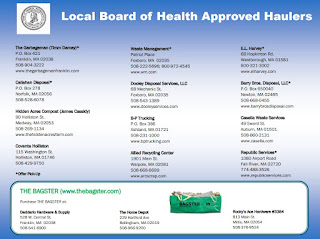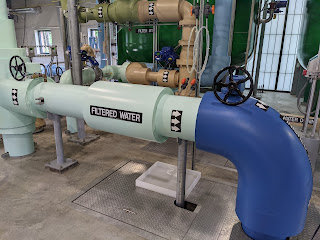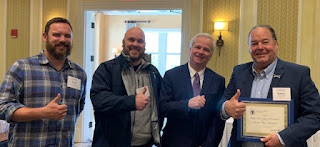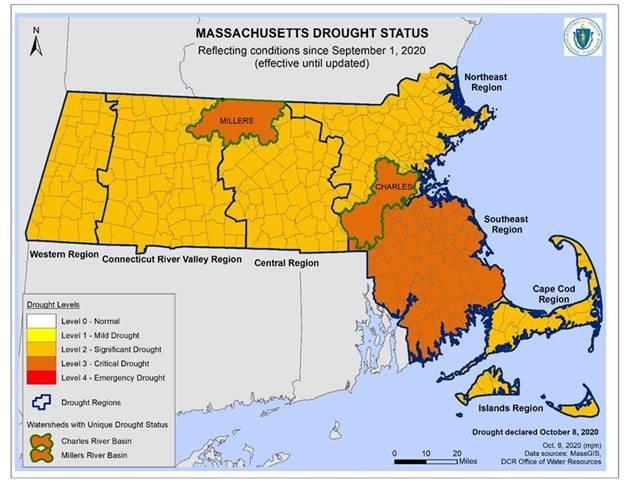In a continuing effort to support a more sustainable Commonwealth, the Baker-Polito Administration today announced $8.1 million in grants through the Gap Energy Grant Program to help water facilities, non-profits and small businesses reduce energy use, increase energy efficiency, and generate renewable energy. The Gap Energy Grants are administered by the Massachusetts Department of Environmental Protection (MassDEP), which operates the initiative under its Clean Energy Results Program. By filling the “gap” in project financing, these grants are made possible through the Climate Protection and Mitigation Expendable Trust and enable its recipients to use utility incentives and funds from other sources to build or install energy efficiency and clean energy projects. This year, the 63 recipients receiving the grants represent three sectors in the state: municipal water facilities; non-profit multi-family affordable housing organizations; and agricultural and food-producing non-profits and small businesses.
“Assisting municipalities, small businesses and non-profit organizations to proactively work to reduce their energy usage and utilize clean, renewable energy is among our top environmental priorities,” said Governor Charlie Baker. “These Gap Energy Grant Program funds will greatly assist these municipalities and organizations as they work to improve efficiency, reduce energy use, and generate clean energy to produce immediate and long-term energy savings and contribute to the state’s efforts to reduce its carbon footprint.”
“The Gap Energy Grant Program enables municipal water utilities and other organizations to leverage critical sources of funding, including energy efficiency incentives from electrical utilities, to fully implement energy saving measures,” said Lieutenant Governor Karyn Polito. “Importantly, with lower energy bills, these entities can reinvest their operational cost savings into their facilities and organizational missions.”
These 63 grant awards will support more than 100 projects that are to be completed by the end of 2024. The projects are anticipated to generate more than 9,000 megawatt hours (MWh) in annual electricity savings or onsite generation of clean energy, sufficient to power more than 250 households and reduce carbon emissions by 3,359 metric tons. Overall, the grantees expect to have an estimated annual savings of up to $1,642,963. Examples of awardees include:
- The City of Pittsfield Wastewater Treatment Plant, which is one of the 41 water-utility facilities receiving grants, will use its grant for its clean energy Combined Heat and Power (CHP) generation project that is expected to save the city over $500,000 annually while reducing electric utility bills by 35 percent;
- The Allston Brighton Community Development Corporation is one of 12 multi-family affordable housing non-profit organizations receiving the Gap grant. The organization plans to use the funding to install a 97-kilowatt (kW) rooftop solar photovoltaic system at five affordable housing buildings, containing 53 units, in Allston;
- The Cambridge Community Center is among seven non-profit food organizations awarded a grant, and will use funding for its food pantry to install a 103.2-kW resilient power microgrid system, consisting of 43.2-kW rooftop solar photovoltaic and a 60-kW combination battery power and biodiesel generator system; and
- Elliot Farm LLC in Lakeville, one of three agriculturally focused small businesses receiving awards, to install a 68.4 kW solar photovoltaic and battery storage system with an Active Demand Response program with Eversource.
“Massachusetts is a national leader in energy efficiency and the development of renewable energy, which the one-of-a-kind Gap Energy Grant Program furthers our collective efforts and delivers beneficial results across the Commonwealth,” said Energy and Environmental Affairs Secretary Beth Card. “These critical grants provide a positive return on investment, not only for the organizations receiving funding, but also for the state, energy utilities, and the public.”
“Based on the success of the Gap Energy Grant Program over the last decade, MassDEP is pleased to expand the program to non-profit multi-family affordable housing and non-profit agricultural and food distribution entities,” said MassDEP Commissioner Martin Suuberg. “These entities, like municipal water utilities, can be limited by funding in accessing deep energy savings and renewable energy opportunities through energy improvements. The non-profit organizations that we are funding with a Gap Energy grant will now be able to reduce energy costs and reinvest those savings into their programs, which serve many of the most vulnerable and needy in our state.”
This year marks the first time that the Gap Energy Grant Program has extended its reach to include non-profit organizations and small businesses. In 2018, the second round of Gap Energy grants awarded 43 drinking water and wastewater treatment facilities $4 million, subsequently funding 36 energy projects that are saving facilities $1.3 million annually and generating approximately 9,580 MWh in annual electricity savings or on-site clean energy generation. In 2014, the first round of Gap Energy grants included awards to 21 water and wastewater facilities of more than $1.7 million for 30 projects that have generated enough electricity to fully heat and power nearly 900 Massachusetts homes each year for 15 years.
“In our efforts to mitigate the climate crisis, pursuing energy efficient initiatives is a critical component to reducing carbon emissions,” said State Senator Julian Cyr (D-Truro). “I am thrilled that water facilities in Edgartown, Orleans, and Yarmouth as well as housing-focused non-profits on Nantucket and Martha’s Vineyard will receive monies from the Gap Energy Grant Program that will help fund local projects that further our community’s clean energy journey.”
“Elliot Farm is a fantastic small business in Lakeville that has continued to evolve and grow,” said State Senator Michael Rodrigues (D-Westport), Chair of the Senate Committee on Ways and Means. “I congratulate Elliot Farm as a recipient of the Massachusetts Gap Energy Grant Program and thank them for being a model business that is demonstrating how to grow a business, be energy efficient, and contribute to a healthier planet.”
For a full list of grant awardees funded by the Gap Energy grants by sector, please visit MassDEP’s webpage.
MassDEP’s mission is to protect and enhance the Commonwealth’s natural resources – air, water and land – to provide for the health, safety and welfare of all people, and a clean and safe environment for future generations. In carrying out this mission, MassDEP commits to address and advance environmental justice and equity for all people of the Commonwealth, provide meaningful, inclusive opportunities for people to participate in agency decisions that affect their lives and ensure a diverse workforce that reflects the communities served by the agency.
Grant award listing -> https://www.mass.gov/doc/massachusetts-gap-iii-energy-grant-awardees/download
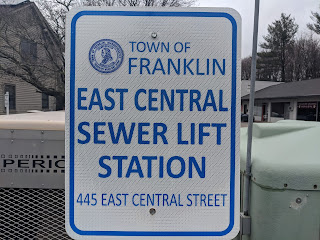 |
| sign at the East Central lift station although not part of this award |

